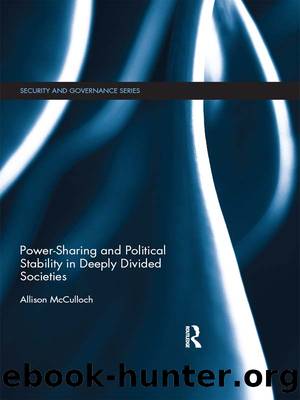Power-Sharing and Political Stability in Deeply Divided Societies by Allison McCulloch

Author:Allison McCulloch
Language: eng
Format: epub
Publisher: Routledge
4 Centripetalism
The principal claim made by centripetalists is that political stability is best achieved by building reciprocal cross-community relationships and by cultivating political moderation on ethnically divisive issues. Left to their own devices, politicians in deeply divided societies will respond to the centrifugal tendency toward ethnic extremism. But if they are given the right institutional incentives, they will develop moderate platforms that appeal to voters beyond their own ethnic group. Politicians elected by cross-community support will need to address the concerns and priorities of all their constituents and not just their own ethnic group, should they desire re-election (Horowitz 1991: 197). This kind of moderation can be institutionally engineered by the use of such strategies as majoritarian-preferential electoral systems, the creation of centrist coalitions, distribution requirements for presidential elections, and administrative federalism. Under this logic, voters will reward the parties that move toward the middle and the parties that stay at the extremes will see their political fortunes diminish (Reilly 2011: 291).
In what follows, I examine the centripetal experience in three cases: Nigeria (focusing on the Second Republic, 1979–1983), Sri Lanka, and Fiji. Nigeria employed distribution requirements for presidential elections and administrative federalism in the attempt at conflict management. Sri Lanka and Fiji, meanwhile, adopted majoritarian-preferential electoral rules; in Sri Lanka, this takes the form of the Supplementary Vote for presidential elections whereas in Fiji, the Alternative Vote was adopted for parliamentary elections, which was also intended to create centrist coalitions. All three cases are deeply divided societies though their divisions have manifested in different ways, with large-scale ethnic violence more common in Sri Lanka and Nigeria than in Fiji. They also share the challenge of economic underdevelopment, post-colonial legacies, and inconsistent records of democratic rule. The cases differ in their levels of stability. Two are unstable. In Sri Lanka, there was a destructive quarter century of ethnic war whereas in Fiji, a coup culture has developed. Nigeria, in turn, experienced imposed stability under centripetal rules. For each case, I examine the nature of its divisions and its institutional attempts at conflict management before providing an assessment of its conflict management. I then turn to a discussion of the lessons proffered by these cases, focusing on the relationship between centripetalism, demography, and deep division. In so doing, I briefly assess the case of Papua New Guinea (PNG), increasingly a popular example of centripetalism. By contrasting the experience in PNG with the three main case studies, I demonstrate the context-specific nature of centripetal practice. The model is reliant on a particular demographic and division-related set of circumstances; when these conditions are not present, instability is the likely outcome.
Nigeria
Heavily influenced by the American political system, with a strong executive presidency and a form of administrative federalism intended to cut across group lines, the constitutional design of Nigeria’s Second Republic (1979–1983) was seen as a novel approach to ethnic conflict management. Indeed, it served as the inspiration for Donald Horowitz’s original articulation of centripetalism. “If one is looking for African democracy in a
Download
This site does not store any files on its server. We only index and link to content provided by other sites. Please contact the content providers to delete copyright contents if any and email us, we'll remove relevant links or contents immediately.
The Secret History by Donna Tartt(18973)
The Social Justice Warrior Handbook by Lisa De Pasquale(12172)
Thirteen Reasons Why by Jay Asher(8858)
This Is How You Lose Her by Junot Diaz(6845)
Weapons of Math Destruction by Cathy O'Neil(6229)
Zero to One by Peter Thiel(5743)
Beartown by Fredrik Backman(5691)
The Myth of the Strong Leader by Archie Brown(5474)
The Fire Next Time by James Baldwin(5398)
How Democracies Die by Steven Levitsky & Daniel Ziblatt(5183)
Promise Me, Dad by Joe Biden(5120)
Stone's Rules by Roger Stone(5060)
A Higher Loyalty: Truth, Lies, and Leadership by James Comey(4923)
100 Deadly Skills by Clint Emerson(4888)
Rise and Kill First by Ronen Bergman(4747)
Secrecy World by Jake Bernstein(4712)
The David Icke Guide to the Global Conspiracy (and how to end it) by David Icke(4664)
The Farm by Tom Rob Smith(4475)
The Doomsday Machine by Daniel Ellsberg(4463)
